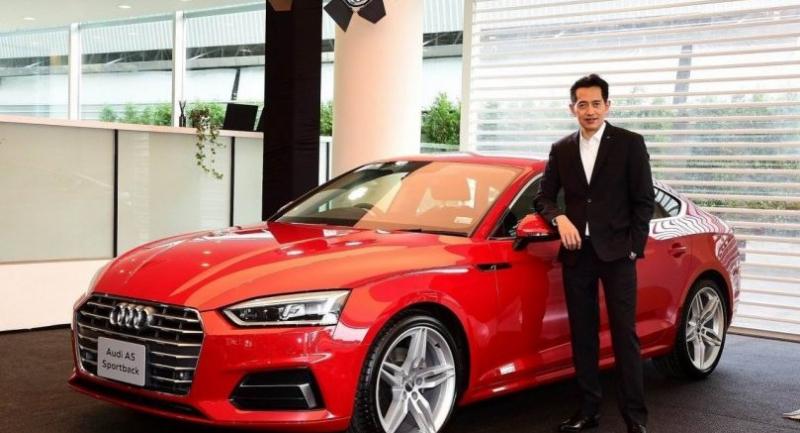Leading the AUDI CHARGE

DESPITE BEING one of the top three German powerhouses in most markets, Audi is going through a kind of reincarnation in Thailand.
Market leaders Mercedes-Benz and BMW have long established themselves as leading luxury car brands in the Kingdom and Audi has always struggled to reach the same level of success.
But in 2016, Audi AG announced the appointment of a new official importer and distributor – Meister Technik Co Ltd, which is also referred to as Audi Thailand.
Meister Technik is led by business tycoon Krisada Lamsam, whose love for Audi cars inspired him to venture into the automotive world.
However, Krisada needed a professional to handle things.
In came Grisnagorn Sawettanan.
Grisnagorn, 50, is the chief executive of Audi Thailand, which means he handles “everything”.
A graduate from St Gabriel’s School, Bangkok University and the National Institute of Development Administration, Grisnagorn started off in 1992 at Thonburi Automotive Assembly Plant Co Ltd (TAAP), which was the official distributor of Mercedes-Benz at the time.
He then moved to Mercedes-Benz (Thailand) in 2002, taking up the position of senior manager for sales, and was responsible for unit sales, dealers, fleet sales, diplomat sales and used-car sales.
Grisnagorn said he chose to walk out of a highly successful company like Mercedes-Benz (Thailand) to join his friends and family at Audi, as it presented a “challenge”.
“I’ve known Krisada and other co-owners for a long time, and setting up a new operation like Audi Thailand seemed like a great challenge for me,” he told The Nation.
“Setting up is a tiring process as it involves wholesale and retail, plus virtually every department including sales, logistics, finance, etc,” he said.
He joined Audi in the fourth quarter of 2016, and Audi Thailand was officially launched in March 2017. By the end of the year, it had achieved its sales target, with 610 vehicles sold to Thai customers.
“Apart from selling cars, our work at Audi Thailand actually involves a lot more such as recreating the Audi brand and leading people back to us,” he said. “There was a lag in Audi sales in Thailand over the past few years, but worldwide Audi has been a highly successful brand.”
Despite the ongoing “dieselgate” emission scandal involving VW Group vehicles, Audi was voted as the most reliable brand in the United States this year, reflecting a strong customer preference for the brand.
Worldwide, Mercedes-Benz sold over 2.1 million vehicles last year, followed by BMW with over 2 million, while Audi followed close behind with 1.87 million vehicles.
In Thailand, Mercedes-Benz sells over 10,000 vehicles per year, while Audi’s target for this year is just 1,200 units.
“In Thailand, Audi has been working hard in advertising with a high level of social media involvement, billboards and continuous PR activities,” Grisnagorn said. “Brand awareness is our No 1 goal.”
Audi’s second goal is to re-establish customer confidence by setting up a dealer network covering all major areas in the country.
“When we went to the [Bangkok International] Motor Show for the first time, customers came from Udon Thani and Phang Nga [provinces] and wanted to purchase our cars. But they said there weren’t any Audi servicing facilities in their provinces. A large number of Audi owners in Chiang Mai have also called for servicing facilities,” he explained.
“Only when we have established a strong network for sales and after sales, can we start looking at serious sales growth,” he said.
While the first Audi showroom and service centre is located on New Petchaburi Road in Bangkok, a second facility has been opened in Pattaya. Most recently, the Bt1-billion Audi Centre Bangkok was opened in Bangkok on Ekamai-Ramindra Road.
Grisnagorn said Audi is planning five to six new dealerships in the near future.
“The Phuket dealership will open at the end of the year, while Udon Thani will be opened next year,” he said, adding that Udon Thani has a potentially large market for luxury cars and Laotian customers can also easily cross over for services.
Most Laotian Audi owners have special models like the RS6, which needs high-quality servicing.
Being an innovative brand with high technology, Audi plans to electrify a large number of its products and bring some to Thailand.
“In terms of EV [electric vehicle], we have been talking with the Thai government and our standpoint is that we follow the government policy 100 per cent. We need to, otherwise we would not be able to survive in the market,” he said.
“EV technology is needed as the new Euro 7 emission standard is so tough it would be difficult to pass without using any electric assistance. You’ll need at least a PHEV [plug-in hybrid] to pass,” Grisnagorn noted.
Audi is also expanding its product line-up in Thailand at a quick pace in order to be present in every sub-segment.
“We know that we can’t compete against rivals that are assembling locally with imported products like the Audi A4 due to the price difference caused by the import duty,” he said. “But the A5 or A4 Avant are very popular, while the A7 comes with very high specs and goes for Bt3 million plus, while its rivals cost over Bt5 million. This is the market segment in which we are highly competitive.”
Although Grisnagorn did not comment on local production plans for Audi, it is understood that when the environment is right, the German luxury brand will not hesitate in starting local assembly in Thailand just like its fellow German rivals.
